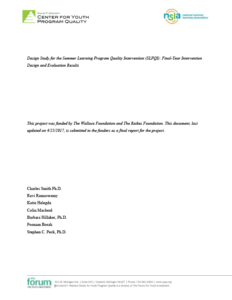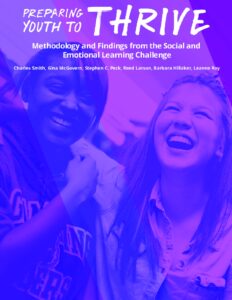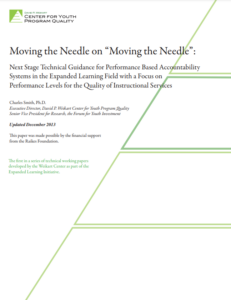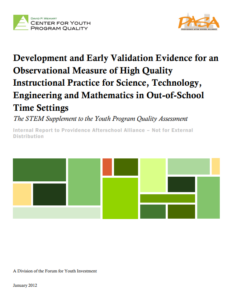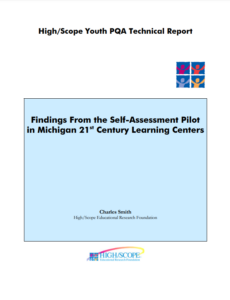This paper describes a generic quality-outcomes design (Q-O design) that meets the need for performance measurement methodology for concurrent and integrated impact evaluation and continuous improvement in the same organization; that is, measure once, cut twice.
Quality-Outcomes Study for Seattle Public Schools Summer Programs
This quality-outcomes study was designed to both (a) describe performance in Seattle Public Schools (SPS) summer learning programs in ways that are useful to staff and (b) provide evaluative evidence (i.e., validity) for an instructional model that includes challenging academic content and responsive instructional practices.
Design Study for the Summer Learning Program Quality Intervention (SLPQI)
This paper describes implementation and outcomes for QIS in school-based summer learning programs in multiple cities.
Preparing Youth to Thrive: Methodology and Findings from the SEL Challenge
This technical report describes methodology and findings for (1) best-practice SEL standards, (2) validation of a suite of SEL performance measures for use in QIS, and (3) performance benchmarks for out-of-school time programs focused on building SEL skills with vulnerable children/youth.
Moving the Needle on “Moving the Needle”
This paper introduces the nomenclature of performance-based accountability systems (PBAS) to the expanded learning field, provides a policy case study for a countywide system in southern Florida and uses data from that system to explore the issue of quality thresholds. We present an expanded design standard to guide development and improvement of PBAS policies and further develop a theory of lower-stakes accountability to guide effective use of incentives of various types. Findings suggest that (1) the PBAS framework defines critical concepts and improves our ability to describe existing quality improvement systems, (2) the Youth Program Quality Assessment (Youth PQA) can be used to produce a program rating of sufficient reliability for use in a PBAS, and (3) that the Palm Beach County PBAS design is an exemplar for expanded learning policies.
Measuring Youth Skills in Expanded Learning Systems: Case Study for Reliability and Validity of YDEKC Skill Measures and Technical Guidance for Local Evaluators
This paper uses pattern-centered methods to increase the usefulness of information available from survey-based skill measures, with a focus on using survey-based skills measures to detect skill change over time.
The STEM supplement to the Youth Program Quality Assessment
This report describes the process of development of the STEM supplement to the Youth Program Quality Assessment and preliminary reliability and validity evidence based on data collected during The Afterzone Summer Scholars program sponsored by the Providence After School Alliance (PASA).
Findings from the Self-Assessment Pilot in Michigan 21st Century Learning Centers
Overall 24 sites within 17 grantees participated in the self-assessment pilot study by assembling staff teams to collect data and score the Youth Program Quality Assessment (PQA). Youth PQA data collected using the self-assessment method demonstrated promising patterns of both internal consistency and concurrent validity with aligned youth survey responses.


